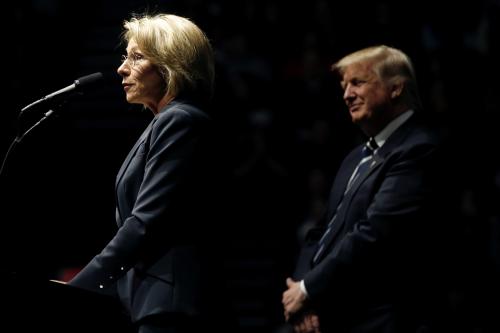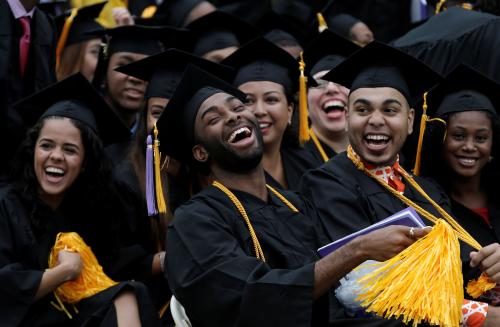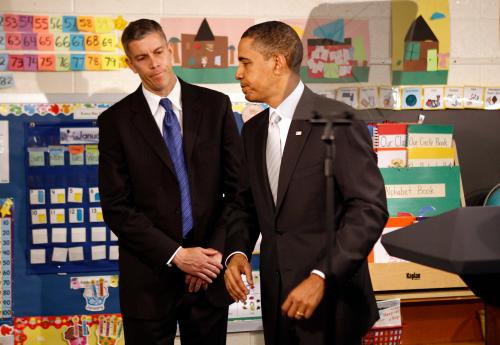The prospect of Michigan philanthropist Betsy DeVos leading the U.S. Department of Education has reignited an intense debate over the limits of government-based accountability for school choice providers, especially charter school organizations and private schools receiving vouchers.
Some proponents of choice argue that formal accountability programs are unnecessary because parents’ ability to select within an unregulated school market provides ample checks against low school quality. Others—including many who otherwise support school choice—insist that monitoring academic performance, student enrollment, and in some cases organization finances is necessary to ensure that parents can choose not simply between more schools but between better schools as well.
To put the question simply, is government participation in the school market an act of oversight or overregulation?
This is a complicated policy problem, in part because unlike the broader research base on the impact of charters or vouchers on student outcomes, there is very little systematic evidence to directly inform the case for or against a robust accountability system for choice programs. Indirect evidence is more prominent, and can be mustered to support both the argument that government participation provides constructive oversight and the argument that such participation threatens destructive overregulation of the school choice market. Let’s list these arguments on both sides.
It’s oversight:
- Accountability systems can benefit the traditional public sector. Studies of NCLB and of school report card-style programs such as New York City’s have found positive impacts. These studies, alongside evidence from Milwaukee on the effect of an NCLB-style program on the city’s private schools, suggest accountability programs may spur student achievement.
- In places like Boston and New York, where charter school authorizers face substantial hurdles to establishing and maintaining their programs, lottery-based estimates of positive charter effects are among the largest nationwide. This suggests that such hurdles encourage (or at minimum, do not discourage) school innovation and ultimately school quality.
- Early indications are that centrally administered systems of choice such as the portfolio model—in particular the common enrollment application—may reduce disparities in access to individual schools of choice by minimizing application burdens for students with particular academic needs. This suggests that local coordination between providers promotes rather than inhibits individual family choice.
- Active charter school closure plans can have positive impacts on the students. In Ohio, students whose low-performing schools were closed realized substantial academic gains after transferring elsewhere. This suggests that robust monitoring of school performance under choice may translate into meaningful benefits for individual students.
- In research available from areas with choice across multiple sectors, and where information on many school attributes is available, parents still consistently rank schools with high academic performance as measured by state testing as their top choices. This suggests that parents can and do make use of government-provided information—especially academic outcomes—when making their choices.
It’s overregulation:
- Studies of accountability in public schools, while generally positive, have also shown that schools may shift their efforts away from low-stakes subjects and skills to focus on tested material. These or other unintended consequences may follow new testing or reporting requirements for choice programs, perhaps undermining the rationale for alternative school options in the first place.
- The worst performance of a choice system by far has been found recently in Louisiana, where students in the state-monitored voucher program woefully underperform those remaining in public schools. If one explanation for these results is that some of the state’s top private schools opted against participating in the voucher program, that may suggest that strict testing and admissions requirements may dissuade high-quality private schools from participating in a voucher program.
- Correspondingly, surveys of private schools participating or considering participation in voucher programs indicate that admissions rules and additional paperwork (though not so much testing) are the primary barriers to participation. This suggests that private schools may be discouraged from joining public choice plans without ample control over who they admit and what they teach.
- Although critics of school choice programs worry that positive effects may be driven in part by schools’ perceived ability to push out low-performing students—and although anecdotal evidence suggests this happens in some charters—there is evidence that exit rates for such students are no higher than in traditional public schools. This suggests that independent school providers may not require disproportionate scrutiny on their student enrollment and retention efforts.
- Parents have pointed to a number of non-achievement explanations for their choice of schools, and tend to be more satisfied with their non-traditional options. This suggests a potential disconnect between how state and local governments define educational success and how parents determine their own priorities.
This oversight versus overregulation debate may be viewed through a market-oriented perspective provided by the field of economics. That perspective includes a focus on school competition as the primary driver of educational quality. But information is also key to a vibrant market, and one compromise between the overregulation and oversight positions could be a system organized around the provision of information to parents and policymakers. Such a system might trust competitive effects driven by the former group will ultimately render a more productive supply of schools while verifying for the latter group that equality of access, financial propriety, and basic levels of academic quality are met.
Public management scholars have stressed the role of basic standards for agency performance—including a framework of easily understood measures for those standards—for more than two decades. School choice programs, and especially vouchers and charter management organizations, bear considerable resemblance to the trends toward third-party provision of and the contracting out of public services not only in the U.S. but abroad. Thus there is opportunity to learn from performance monitoring programs of other, non-education initiatives supported by taxpayer dollars as well.
All of which is to say that a defensible and research-sown middle ground between oversight and overregulation is obtainable, for those inclined to find and defend it.
The Brookings Institution is committed to quality, independence, and impact.
We are supported by a diverse array of funders. In line with our values and policies, each Brookings publication represents the sole views of its author(s).






